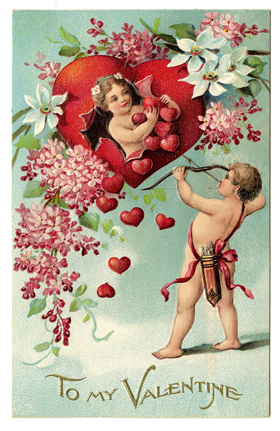The little winged god Cupid, armed with his deadly bow and arrow, and aiming here, there,  and everywhere his deestructive darts, has, we are fain to believe, the fatal power of rendering his victims blind, so that they have no longer any sense of proportion, and ofttimes make themselves ridiculous in the eyes of clearer-sighted mortals.
and everywhere his deestructive darts, has, we are fain to believe, the fatal power of rendering his victims blind, so that they have no longer any sense of proportion, and ofttimes make themselves ridiculous in the eyes of clearer-sighted mortals.
Edwin – to most people a very commonplace young fellow, neither better nor worse than the rest of mankind — is to the woman who loves him a very king among men. His nondescript features are to her the highest type of manly beauty; his trite qualities of heart and mind are to her synonymous with innate nobility of character and sterling worth; while his very faults are glossed over to appear more attractive than other men’s virtues.
Angelina, with whom Edwin in love, undergoes a corresponding transformation. Indeed, few of her friends and acquaintances would recognize her in the guise in which she presents herself in his eyes. She is to him the very pearl of womankind, endowed with all the gifts and grace, without any of the failings of her sex.
Is it wise to idealize the loved one to this extent? is often asked by those onlookers who, repute has it, see most of the game. Is it not far better to note the little weaknesses and shortcomings,and to gradually work a reform before marriage, so that they may be spared the pangs of disillusion which are sure to follow after the
knot has been tied?
The reply to these pessimists and cynics, who are always desirous that things should be represented as they are — stripped of any false glory — is that love, far from being blind, is in reality frequently clearer-visioned than the rest of the world. It may be that he wears rose-colored spectacles, but certain it is that behind the commonplace exterior love discerns the hidden possibilities awaiting only his magic touch to spring forth in all their strength and beauty.
How often do we hear the remark, “So-and-so has completely changed; his wife has been the making of him”? Is not this due to the idealization of the lover, and the endeavor to live up to it by the loved one? People are inclined to give us just so much as they see we expect from them, and so it comes about that the woman who idealizes her sweetheart, and endows him with many good qualities which he does not possess, eventually, by the very intensity of her love and desire that he should possess them, creates them in him.
A notable instance was that of a man who was considered by all his friends to be particularly bad-tempered. One day he fell in love, and became engaged.
To the secret amusement of his circle of acquaintances, his fiancee went about extolling his good temper! Everyone prophesied her speedy disillusionment. But in a few months, to their surprise, he completely lost his irritability, and it became evident to all that he had actually been metamorphosed into the good-tempered fellow his sweetheart had always declared him to be. He had only shown his best side to her, and she had so idealized this view of him that, in order to live up to her estimate, he had become quite a changed character.
Men are more often than not a little dismayed at the glorified version of themselves, which their sweethearts are prone to indulge in, but instinctively they endeavor to live up to the ideal presented to them, and in doing so frequently become possessed of the very qualities in which they were deficient.